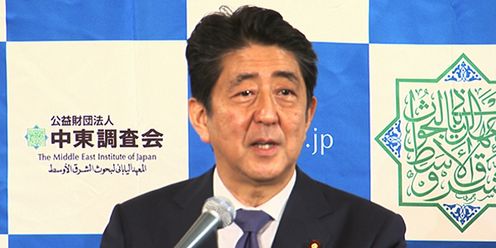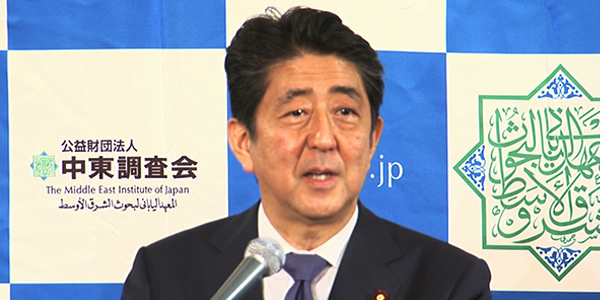Home > News > The Prime Minister in Action > July 2017 > Reception for the Retirement and Inauguration of the President of the Middle East Institute of Japan
The Prime Minister in Action
Reception for the Retirement and Inauguration of the President of the Middle East Institute of Japan
July 24, 2017
[Provisional Translation]
Prime Minister Shinzo Abe attended a reception for the retirement and inauguration of the President of the Middle East Institute of Japan held in Tokyo.
The Prime Minister said in his address,
“I would like to say a few words today on the occasion of this party for the retirement and inauguration of the President of the Middle East Institute of Japan.
Firstly, I want to express my respect for all of the efforts everyone at the Middle East Institute of Japan, including Chairman Sasaki, has been making on a daily basis to deepen mutual understanding and develop cooperative relationships in a variety of fields among Japan and the countries of the Middle East.
The countries of the Middle East are indispensable and vital partners for Japan, not only from the perspective of our energy security, but also from the perspective of economic activities, including private investment and technical cooperation, with many Japanese companies expanding into the Middle East. Furthermore, I believe cultural and people-to-people exchanges are taking place actively in the public and private sectors and multilayered relationships have been established.
I myself place a significant importance on our relationship with the Middle East countries. Since the inauguration of my second administration, I have visited the Middle East six times, and the number of its countries and regions I have visited has now reached 11. I myself am surprised by how many places I have visited. In addition, I have welcomed numerous leaders from the Middle East to Japan and have held a series of dialogues. Each time I have felt the tremendous expectations placed on Japan.
The Abe administration in particular has been making an effort to strengthen our relationship with the Middle East not only in the energy sector, but also in a variety of other fields. Members of the business community have accompanied me on my trips to the Middle East, and we have sent out strong messages that Japan is seeking not only a stable supply of energy and that Japan would play a role also in the Middle East’s effort to overcome its dependence on energy. At the same time, I believe our bilateral relations must not be limited to an economic one and must extend to a variety of other sectors.
In working with the international community to deal with issues such as the violent extremism and terrorism perpetrated by ISIL and other groups, I have been citing the teaching of Islam that ‘the best way is in the middle’ in highlighting the importance of respecting diversity and exercising tolerance.
Dr. Arima, who is retiring as President of the Middle East Institute of Japan, has served in this capacity for 15 years. During that time, Dr. Arima proactively held seminars and symposiums to revitalize dialogues with Muslim and Middle East countries, and undertook pioneering initiatives to spread a correct understanding of Islam.
In particular, Dr. Arima leveraged his personal connections in the United States in his efforts to strengthen the Institute’s activities under a global framework that also takes into account the U.S. policy on the Middle East. Without these achievements, the Middle East Institute of Japan would likely not be what it is today.
Actually, before I was even a member of the Diet, I received a lot of guidance from Dr. Arima who is an alum of my high school many years my senior. Dr. Arima has also made a considerable contribution toward peace in the Middle East as a representative of the Government. The Government is currently working to promote the Corridor for Peace and Prosperity concept in cooperation with Jordan, Palestine, and Israel, and Dr. Arima has made an enormous contribution in promoting this concept as well. Indeed, this Institute must truly evolve further by building upon the achievements made by Dr. Arima.
As for Mr. Saiki, who will be newly appointed as President, as everyone already knows, he is a star of the Ministry of Foreign Affairs. He is not only a tall and handsome man, but someone with depth; he was a true diplomatic leader. I want to thank former Vice-Minister Saiki for the enormous contribution he made in advancing Abe diplomacy. In working with the Middle East, a region of critical importance for Japan, I have high expectations for Mr. Saiki to demonstrate his abilities that have supported Japan’s diplomacy thus far to elevate the relationship between Japan and the Middle East to a new level.
Lastly, I would like to close my remarks by stating my expectations and hopes for the further development of the Middle East Institute of Japan, and for its great contribution to Japan’s diplomacy.
Dr. Arima, thank you for your excellent work, and I look forward to continuing to work with you in the future. Mr. Saiki, I look forward to your success.”


